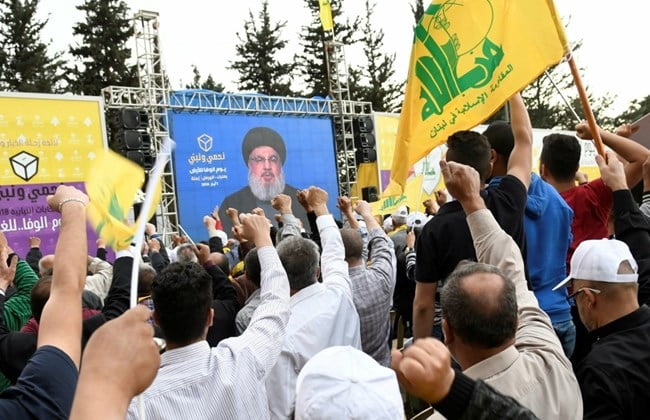
The U.S.Department of the Treasury’s Office of Foreign Assets Control (OFAC) sanctioned former Lebanese government ministers Yusuf Finyanus and Ali Hassan Khalil, who provided material support to Hezbollah and engaged in corruption. These designations underscore how some Lebanese politicians have conspired with Hezbollah at the expense of the Lebanese people and institutions.
The United States supports the Lebanese people in their calls for a transparent and accountable government free of corruption. The catastrophic explosion at the port of Beirut on August 4, 2020, has amplified these urgent calls, and the U.S government stands firmly in support of the Lebanese people’s demands.
“Corruption has run rampant in Lebanon, and Hezbollah has exploited the political system to spread its malign influence,” said Secretary Steven T. Mnuchin. “The United States stands with the people of Lebanon in their calls for reform and will continue to use its authorities to target those who oppress and exploit them.” These individuals are being designated pursuant to Executive Order (E.O.) 13224, as amended.
The multi-layered crisis in Lebanon stems from decades of corruption and economic mismanagement. Some Lebanese political leaders have used backdoor deals and reliance on Hezbollah for personal gain and gains for their political allies ahead of the needs of the Lebanese people. Since October 2019, popular, cross-sectarian protests across the country demanded political and economic reform in Lebanon. The protesters’ calls for “all of them, means all of them” demonstrates the seriousness of their desire for reform and to pull back the curtain on certain groups’ corruption, including Hezbollah.
Corrupt Ministers support Hezbollah and benefit personally
Yusuf Finyanus is the former Minister of Transportation and Public Works (2016-2020). As of mid-2019, Hezbollah used its relationship with officials in the Lebanese government, including Finyanus as Minister of Transportation and Public Works, to siphon funds from government budgets to ensure that Hezbollah-owned companies won bids for Lebanese government contracts worth millions of dollars.
In 2015, Hzbeollah gave Finyanus hundreds of thousands of dollars in exchange for political favors. Also in 2015, Finyanus met regularly with Wafiq Safa, whom the U.S. Treasury designated in 2019 for his leadership role in Hezbollah’s security apparatus.
Finyanus also helped Hezbollah gain access to sensitive legal documents related to the Special Tribunal for Lebanon and served as a go-between for Hezbollah and political allies. In addition to his activities supporting Hezbollah, Finyanus engaged in corruption while in his position as Minister of Transportation and Public Works by diverting funds from the ministry to offer perks to bolster his political allies.
Ali Hassan Khalil previously served as the Minister of Finance (2014-2020) and Minister of Public Health (2011-2014). As Minister of Finance, Khalil was one of the officials Hezbollah leveraged a relationship with for financial gain.
In late 2017, shortly before the Lebanese parliamentary elections that would take place in May 2018, Hezbollah leaders, fearing a weakening of their political alliance with the Amal Movement, reached an agreement with Khalil where he was prepared to receive Hezbollah support for his political success. Khalil worked to move money in a manner that would avoid U.S. sanctions enforcement from government ministries to Hezbollah-associated institutions.
Additionally, Khalil used his position as Minister of Finance to attempt to have U.S. financial restrictions on Hezbollah eased so that the group would have less difficulty moving money. Khalil also used the power of his office to exempt a Hezbollah affiliate from paying most taxes on electronics imported to Lebanon, and a portion of what was paid was collected to support Hezbollah. As of late 2019, Khalil as Finance Minister refused to sign checks payable to government suppliers in an effort to solicit kickbacks. He demanded that a percentage of the contracts be paid to him directly.
Sanctions implications
The Treasury Department continues to prioritise disruption of the full range of Hezbollah’s illicit financial activity, and with this action has designated over 90 Hezbollah-affiliated individuals and entities since 2017. OFAC took this action pursuant to E.O. 13224, as amended, which targets terrorists and those providing support to terrorists or acts of terrorism. Hezbollah was designated by the Department of State as a Foreign Terrorist Organization in October 1997 and as a Specially Designated Global Terrorist (SDGT) pursuant to E.O. 13224 in October 2001.
As a result of today’s action, all property and interests in property of the individuals named above, and of any entities that are owned, directly or indirectly, 50 percent or more by them, individually, or with other blocked persons, that are in the United States or in the possession or control of U.S. persons, are blocked and must be reported to OFAC. Unless authorised by a general or specific license issued by OFAC or otherwise exempt, OFAC’s regulations generally prohibit all transactions by U.S. persons or within (or transiting) the United States that involve any property or interests in property of designated or otherwise blocked persons. The prohibitions include the making of any contribution or provision of funds, goods, or services by, to, or for the benefit of any blocked person or the receipt of any contribution or provision of funds, goods or services from any such person.
Furthermore, engaging in certain transactions with the individuals designated today entails risk of secondary sanctions pursuant to E.O. 13224, as amended, and the Hezbollah Financial Sanctions Regulations, which implements the Hezbollah International Financing Prevention Act of 2015, as amended by the Hezbollah International Financing Prevention Amendments Act of 2018.
Pursuant to these authorities, OFAC can prohibit or impose strict conditions on the opening or maintaining in the United States of a correspondent account or a payable-through account by a foreign financial institution that knowingly facilitates a significant transaction for a terrorist group like Hezbollah, or a person acting on behalf of or at the direction of, or owned or controlled by, an SDGT such as Hezbollah.
OFAC closely coordinated this action with the Drug Enforcement Administration (DEA). DEA’s work with OFAC is part of DEA’s broader effort under its Project Cassandra to target Hezbollah’s global criminal support network that operates as a logistics, procurement, and financing arm for Hezbollah.





